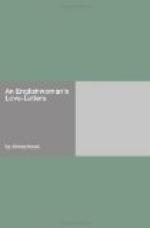LETTER L.
Beloved: No, not Browning but Tennyson was in my thoughts at our last ride together: and I found myself shy, as I have been for a long time wishing to say things I could not. What has never entered your head to ask becomes difficult when I wish to get it spoken. So I bring Tennyson to tell you what I mean:—
“Dosn’t thou ’ear
my ’erse’s legs, as they canters awaaey?
Proputty, proputty,
proputty—that’s what I ’ears
’em saaey.”
The tune of this kept me silent all the while we galloped: this and Pembury, a name that glows to me now like the New Jerusalem.
And do you understand, Beloved? or must I say more? My freedom has made its nest under my uncle’s roof: but I am a quite independent person in other ways besides character.
Well, Pembury was settled on your own initiative: and I looked on proud and glad. Now I have my own little word to add, merely a tail that wags and makes merry over a thing decided and done. Do you forgive me for this: and for the greater offense of being quite shy at having to write it?
My Aunt thanks you for the game: for my part I cannot own that it will taste sweeter to me for being your own shooting. And please, whatever else you do big and grand and dangerous, respect my superstitions and don’t shoot any larks this winter. In the spring I would like to think that here or there an extra lark bubbles over because I and my whims find occasional favor in your sight. When I ask great favors you always grant them; and so, Ahasuerus, grant this little one to your beautifully loving.
* * * * *
Give me the credit of being conscious of it, Beloved: postscripts I never do write. I am glad you noticed it. If I find anything left out I start another letter: this is that other letter: it goes into the same envelope merely for company, and signs itself yours in all state.
LETTER LI.
Dearest: It was so nice and comedy to see the Mother-Aunt this morning importantly opening a letter from you all to herself with the pleasure quite unmixed by any inclosure for me, or any other letter in the house to me so far as she was aware. I listened to you with new ears, discovering that you write quite beautifully in the style which I never get from you. Don’t, because I admire you in your more formal form, alter in your style to me. I prefer you much, for my own part, formless: and feel nearer to your heart in an unfinished sentence than in one that is perfectly balanced. Still I want you to know that your cordial warmed her dear old heart and makes her not think now that she has let me see too much of you. She was just beginning to worry herself jealously into that belief the last two days: and Arthur’s taking to you helped to the same end. Very well; I seem to understand everybody’s oddities now,—having made a complete study of yours.




